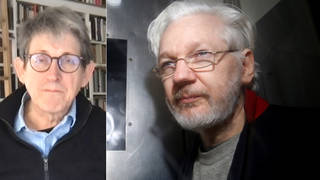
Guests
- Daniel EllsbergPentagon Papers whistleblower.
- Jacob Appelbauma computer security researcher. He is a developer and advocate for the Tor Project, a system enabling its users to communicate anonymously on the Internet.
As a lawsuit challenging a law that gives the government the power to indefinitely detain U.S. citizens is back in federal court this week, we continue our conversation with perhaps the country’s most famous whistleblower, Daniel Ellsberg, and computer security researcher, Jacob Appelbaum, who is also a former WikiLeaks volunteer. Appelbaum describes being interrogated by a U.S. Army official on American soil after he returned to the country following a speech he gave on behalf of Julian Assange. “When I was detained … there was [also] an Immigration and Customs Enforcement officer, who I heard say, 'So that's what a terrorist looks like these days.’” Ellsberg, the former military analyst who released the Pentagon Papers, discusses the Yoko Ono Courage Award given to Assange earlier this week, and recalls the importance of similar support he received from Barbra Streisand as he faced treason charges and a sentence of life in prison.
Watch part 1 of this interview with Appelbaum.
Watch part 2 of this interview with Daniel Ellsberg.
AMY GOODMAN: I’m Amy Goodman, with Nermeen Shaikh. And our guests are Dan Ellsberg, premier whistleblower in this country, 40 years ago released the Pentagon Papers—he was a high-level Pentagon official, worked for the RAND Corporation. It was the secret history of U.S. involvement in Vietnam. And Jacob Appelbaum is with us, computer security researcher, developer and advocate for the Tor Project, which is a system enabling its users to communicate anonymously on the Internet, has worked with WikiLeaks and, as a result, has been stopped at airports more than a dozen times.
In fact, Jacob, could you talk about what happened to your fiancée? You live in Washington state. This is very frightening.
JACOB APPELBAUM: Sure. Normally, I don’t talk about her in public because I’m pretty worried about her being targeted. But since you brought it up, I guess, you know, she woke up in the middle of the night one night, I think just a little over a year ago now. I was in Iceland working with a friend about their constitution’s reform. And she saw two men outside of her house on the ground floor in her backyard, meaning that they were on her property inside of a fence. And they—one of them was wearing night vision goggles and watching her sleep. And when she called the Seattle police, she was denied the ability to file a police report twice, until we had the ACLU help her. And, you know, much to their credit, Brian Alseth from the ACLU of Washington came down to her house. They again called the police. And finally, on the third try, the Seattle police finally allowed her to file a report.
AMY GOODMAN: I don’t understand. What did the police say? She called, and she said, “There’s someone with night goggles on looking in at me”?
JACOB APPELBAUM: Well, so the issue is a little more complicated than that. I mean, it’s impossible to pick up a telephone now without turning on a light. Phones glow. So she just laid in bed in pure terror for the period of time in which they stood there and watched her. And presumably, this is because there was a third person in the house placing a bug or doing something else, and they were keeping watch on her to make sure that if she were to hear something or to get up, they would be able to alert this other person. And so, when she called the police, she did so after the fact.
And they came eventually—again, the third time that she called. And when they came, they indeed looked by the window, saw that there was broken grass—that is, outside of her window where they had been standing. They tried to tell her that she was hysterical. And, I mean, who wouldn’t be upset about that? And basically, when confronted about whether or not it was their surveillance operation, they suggested that they’re too good, that she would never catch them, which is not really a very nice thing. And they also suggested that maybe she had been in with some unpleasant people, or the last people that had lived here had maybe been involved in some kind of operation that had caused her to be the—you know, the target of some surveillance. And they sort of backpedaled a bit. But the Seattle police are—even Obama’s Justice Department has called them pretty bad police, which is really saying something when you consider what the Department of Justice says for Obama.
AMY GOODMAN: What do you mean?
JACOB APPELBAUM: Well, that they use excessive force in a systematic way. And the Department of Justice has sanctioned the Seattle Police Department for this, and that there’s been a big battle between the federal government and the Seattle city, actually, about the police use of systematic violence, especially against Occupy protesters. So it’s no surprise to me that they would be complicit in a surveillance operation against an innocent woman who has nothing—who’s done nothing wrong, terrorizing her in her own house while she’s sleeping alone.
NERMEEN SHAIKH: Well, you’ve been stopped more than a dozen times in airports. Can you explain when that started and what you believe it was prompted by?
JACOB APPELBAUM: Sure. In the summer of 2010, I spoke on behalf of Julian Assange at Emmanuel Goldstein’s Hackers on Planet Earth here in New York City. And I had actually given this talk for Julian. I left for Europe for a work conference. And on the return, I was detained by the U.S. military, in fact, on U.S. soil. Very few people actually know this. But Dan Ellsberg’s case is so important, specifically because it’s not theoretical. When I was detained on the return in the summer of 2010, there was an Immigration and Customs Enforcement officer, who I heard say, “So that’s what a terrorist looks like these days.” And I said, you know, “I don’t think that that’s the case.” But obviously they didn’t really want to talk very friendly to anyone that they consider to be a terrorist.
But in the interrogation room, in which I mostly just used humor, there was a U.S. Army guy. And this U.S. Army person was in fact interrogating me, denying me access to a lawyer, denying me access to a bathroom but giving me water. I mean, as far as enhanced interrogation techniques go, it’s pretty light: They didn’t waterboard me or do anything like that. But they did take my electronics. And I can’t say anything more about that, unfortunately.
AMY GOODMAN: Why?
JACOB APPELBAUM: Well, because we don’t live in a free country. And so, if there were certain kinds of legal orders, I wouldn’t even be able to talk about them in specific.
AMY GOODMAN: I want to turn to a clip of you speaking at the HOPE conference—that’s Hackers on Planet Earth—in 2010. You were speaking on behalf of WikiLeaks.
JACOB APPELBAUM: Hello to all my friends and fans in domestic and international surveillance. I’m here today because I believe that we can make a better world. Julian, unfortunately, can’t make it, because we don’t live in that better world right now, because we haven’t yet made it. I wanted to make a little declaration for the federal agents that are standing in the back of the room and the ones that are standing in the front of the room, and to be very clear about this: I have on me, in my pocket, some money, the Bill of Rights and a driver’s license. And that’s it. I have no computer system. I have no telephone. I have no keys, no access to anything. There’s absolutely no reason that you should arrest me or bother me. And just in case you were wondering, I’m an American, born and raised, who’s unhappy. I’m unhappy with how things are going.
AMY GOODMAN: There you have it, Jacob Appelbaum at the HOPE conference—that’s Hackers on Planet Earth—in 2010. Jeremy, you said you were in Iceland, and we just read a headline—I mean Jacob. You said you were in—I was just thinking actually about Jeremy Hammond. It was something that you retweeted about Jeremy Hammond, a case that we have looked at, who has now just been placed in solitary confinement. That has been tweeted out. But in 2010, you talked about being in Iceland. It’s interesting. We just had a headline where the Icelandic government turned back FBI agents who had flown in on a private plane to investigate WikiLeaks in Iceland. And the Icelandic government called them in and said, “Get out of here.”
JACOB APPELBAUM: Yeah, I’ve heard about that. That’s great of the Icelandic government to do that.
AMY GOODMAN: Dan Ellsberg, I saw you at the honoring of Julian Assange at the Museum of Modern Art, Yoko Ono Lennon Prize for Courage. What is your sense of Julian Assange right now, in jail, in the Ecuadorean embassy, for more than eight months holed up? He’s already been granted political asylum by Ecuador, but they can’t get him to Ecuador because the British government says they’ll arrest him and they’ll extradite him to Sweden. He’s afraid then Sweden would extradite him to the United States.
DANIEL ELLSBERG: I talked to his lawyers last night. I think there’s every reason—at some length—every reason to assume that if he goes to Sweden, and according to their regulations, he’ll be put immediately in custody, will have no further ability to apply for asylum anywhere and no—and be totally vulnerable to extradition. I asked, by the way, about the difference between Sweden and England when it comes to extradition. It turns out to be quite a complex subject, and I think I understand some of it now. I won’t try to go into it. But he does have reason to believe that if he went to Sweden, he would either, after the Swedish proceedings, which he has no fear of whatever, no really basis for fear, even if they should go—
AMY GOODMAN: This is where he is wanted—he’s—
DANIEL ELLSBERG: —even if they should go against him, that his fear would be that either immediately or after he had served a sentence, if that proved to be the conviction, that he would be sent to the United States and essentially be incommunicado, under the provisions of this 1021(b)(2) of the NDAA, could be in Guantánamo—
AMY GOODMAN: Wait, explain 1022—
DANIEL ELLSBERG: 1021—I said 1022—1021(b)(2) of the National Defense Authorization, the point that has been charged unconstitutional by Judge Katherine B. Forrest and which the government and Senator McCain will be arguing tomorrow [Feb. 6] should be regarded as constitutional, which, by the way, I believe means that they are violating their oath—the oath I took as a marine, the oath they took as senators—to uphold and support the Constitution. I believe here we have a case that isn’t really arguable. Senator—Justice Forrest makes a compelling, compelling argument that this is blatantly unconstitutional and can’t really, in good faith, by an intelligent person, be regarded as consistent with the United States Constitution, as written. I think they are violating that oath. And although I’m not aware of any senator ever suffering any sanction for violating his or her oath to uphold the Constitution, there should be a way of getting at them. I think it’s an impeachable offense.
Let me make clear: Politically, I think there is zero chance of impeachment of either them or of President Obama, who has richly earned it, for doing the same things that George W. Bush did. As I understand it, with September 11th, more than a dozen years—10 years ago, and even earlier, in 2011, I think that the officials of this government, led by Bush, Obama—David Addington, Bybee, Feith, Yoo, others—basically regard themselves as—
AMY GOODMAN: “Yoo” meaning Y-O-O.
DANIEL ELLSBERG: Y-O-O, sorry; I always have to say that.
AMY GOODMAN: Not us.
DANIEL ELLSBERG: Not you. If only, if only we had you in there. But although I have to say the corruption, the corruption that seems to be endemic in accepting an executive branch position, is something that I would not trust myself to be free of, I have to say, when I see what it’s done to people, really.
But in any case, I think they think of themselves of having essentially suspended the United States Constitution and that they’re operating under a different set of rules, which effectively mean no rules for the president of the United States, that he’s bound by no treaty, constitution, law, anything whatever. In short, Richard Nixon’s philosophy—mentioned in connection with what he did against me, by the way, at the time, to David Frost—which was: When the president does it, it’s not illegal. Puts him above the law, in a way that actually no British monarch has been above the law since John the First, with the Magna Carta. It gives him an absolute monarchy character, which I think is the nature of the U.S. presidency right now.
AMY GOODMAN: When I saw you at the Museum of Modern Art, you had a very—you had this photograph of you, John Lennon, Yoko Ono and Barbra Streisand. And you—
DANIEL ELLSBERG: I gave it to Yoko as a memory of the last time I saw her 40 years ago.
AMY GOODMAN: And you talked about how Barbra Streisand may well have saved America.
DANIEL ELLSBERG: Well, Barbra Streisand offered to do a fundraiser for us in the last month of our trial, at a time when we had no money left. And we were practically—
AMY GOODMAN: You were being charged with treason for releasing the Pentagon Papers.
DANIEL ELLSBERG: —being charged with 115 years, possibly life sentence—pretty much a life sentence. With good behavior, I would have gotten out a couple years ago, if I had good behavior. And she—we were really prepared to stop calling witnesses and to basically go into final argument, just essentially for economic reasons.
AMY GOODMAN: Because you had run out of money.
DANIEL ELLSBERG: We had run out of money. And she—very expensive process. And she offered a fundraiser, which raised a lot of money for that time, by auctioning off songs, actually, for The Beatles, appeared for. Had she not done that, and had the trial ended, on a day, by the way, when President Nixon, through John Ehrlichman, was offering my judge, Matthew Byrne, the head of the—head of the FBI.
AMY GOODMAN: Offering to make Matthew Byrne the head of the FBI, your judge.
DANIEL ELLSBERG: Make Matthew Byrne head of the FBI—his lifelong ambition, as it so happened—clearly contingent on a suitable ending to my trial. So I think I was pretty well fated to be found guilty, had that not been leaked to the public. And he dismissed that as a charge for dismissing the trial. He said it hadn’t affected him, that offer.
But many other crimes, such as the warrantless wiretapping and the attempt to assault me, did lead to that, only because the trial was kept going for another month. It was during that month that John Dean’s acknowledgment to the prosecutors about the White House efforts to silence me, to blackmail me, to go into my doctor’s office, warrantless wiretapping, to assault me, use the CIA against me, which at that time was illegal—all of these things now being legal, by the way, but at the time being illegal—subjected him to impeachment hearings and led to his resignation. Without that, he would have stayed in office, and the war would have continued for at least another couple of years. So that initiative of people giving support, to a man that the administration was trying to make a pariah, just as they are making that effort with Julian Assange and Bradley Manning right now, and the willingness of American citizens to stand up and say, “We stand with him,” like the people who wear signs now saying, “I am Bradley Manning” — in my case, I wore a sign for television saying, “I was Bradley Manning,” very, very apt — and without that demonstration, you have a kind of isolation that makes it very difficult for anyone else to do anything—anything that possibly supports the constitutional principles here.
So, there was a case when the Constitution worked. There was an independent judiciary. There was Congress cutting off money for an illegal war, eventually. There was the threat of impeachment, which was put in the Constitution, which, by the way, is something George the Third was not subject to. You did have impeachment in Britain, but not for the monarch. And we do have it in this country. When the monarch is violating the Constitution, violating the law, that’s why it’s there. Everything worked, and it made it possible to end a war. And it was a great tribute to the ability of our process to work.
That’s what I felt last night, when I called my wife on the West Coast, having read Katherine Forrest’s opinion, and said, “I’m proud to be an American.” This is a document now that expresses our highest ideals, and it’s actually working. It’s not just a columnist saying the way it should be. This is a [woman] saying, “The representatives to the government that appointed me are mistaken in their reading of the law. They have” — to paraphrase her, I’m definitely paraphrasing her — “They have produced an argument that is worthy of Communist China or of Stalinist Russia or of other countries, authoritarian countries I could name. It is not an American document.” Now, the circuit court may not have that courage or that commitment. I hope the Supreme Court will, when it goes to the Supreme Court. An interesting thing that I read, by the way, is that one justice on our side is Justice Scalia. I don’t normally find myself on the same side as Justice Scalia, and I imagine that if he rules in our favor on this, as he may, because he has a sense of the Constitution and of the inability of the president to detain people without charges. I suppose that may lead to a rift with Clarence Thomas and some others. But I do hope that the Supreme Court will have a chance to uphold our constitutional framework. And that’s worth living and dying for.
NERMEEN SHAIKH: I want to turn to a clip from another whistleblower, William Binney, formerly of the National Security Agency, where he spent nearly 40 years, but retired about a month after September 11th, 2001, due to concerns over unchecked domestic surveillance.
WILLIAM BINNEY: After 9/11, all the wraps came off for NSA, and they decided to—between the White House and NSA and CIA, they decided to eliminate the protections on U.S. citizens and collect on domestically. So they started collecting from a commercial—the one commercial company that I know of that participated provided over 300—probably, on the average, about 320 million records of communication of a U.S. citizen to a U.S. citizen inside this country.
AMY GOODMAN: What company?
WILLIAM BINNEY: AT&T. It was long-distance communications. So they were providing billing data. At that point, I knew I could not stay, because it was a direct violation of the constitutional rights of everybody in the country. Plus it violated the pen register law and Stored Communications Act, the Electronic Privacy Act, the intelligence acts of 1947 and 1978. I mean, it was just this whole series of—plus all the laws covering federal communications governing telecoms. I mean, all those laws were being violated, including the Constitution. And that was a decision made that wasn’t going to be reversed, so I could not stay there. I had to leave.
NERMEEN SHAIKH: Jacob Appelbaum, that was William Binney, National Security Agency whistleblower. Could you comment on what he said?
JACOB APPELBAUM: Yeah. I mean, essentially, what William Binney is saying is that there’s a warrantless wiretapping program. He was privy to this. He named individuals that are actually responsible for it. And as Ellsberg is saying, these should be—these types of things are impeachable offenses. And what Binney is saying is completely terrifying, because the government is asserting different things, such as state secrecy in NSA v. Jewel. And we don’t actually have a democratic process, because we’re not being told these things, except by whistleblowers, who are being targeted by the FBI. I mean, he had a gun pulled on his head in the shower. He has one leg. An FBI agent put a gun to his head.
AMY GOODMAN: William Binney is a diabetic amputee.
JACOB APPELBAUM: Yeah.
AMY GOODMAN: His wife and his son were in the house. His wife and child were in the house.
JACOB APPELBAUM: Absolutely.
DANIEL ELLSBERG: He was in the shower when they arrived, and they put a gun to his head.
JACOB APPELBAUM: I mean, what is that? It’s intimidation. And why is that? Because the FBI is complicit in impeachable offenses against the American people.
AMY GOODMAN: Jacob, you have said, “Data retention is the beginning of the end of many of our freedoms in bulk, and that’s a very scary thing.”
JACOB APPELBAUM: That’s absolutely the case. Data retention is what enables retroactive policing. I mean, what the NSA and other government agencies can do now—for example, with the Fort Hood incident, what we learned was that they already had everything on the person that they alleged did a shooting, and the reason is because they were proactively wiretapping, and they simply dipped into their database, looked for matches of information, everything this person had done electronically, and they pulled it out. And they probably did this without a warrant. And this kind of retroactive policing is the stuff that the Stasi would dream of having, but they didn’t have. And so, now we have, in effect, a surveillance state the likes of which the world has never seen before.
AMY GOODMAN: We are talking to Jacob Appelbaum and Daniel Ellsberg, and we are asking you, please, to go to the phone. This is Democracy Now!, democracynow.org, The War and Peace Report.












Media Options